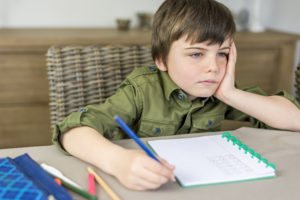 If you are a father who has recently gone through a breakup or are considering separating from your spouse, you are likely wondering how does divorce affect children’s academic performance. Divorce can be earth shattering for children, and one of the biggest challenges for divorced parents is helping their kids through the process.
If you are a father who has recently gone through a breakup or are considering separating from your spouse, you are likely wondering how does divorce affect children’s academic performance. Divorce can be earth shattering for children, and one of the biggest challenges for divorced parents is helping their kids through the process.
This is hard enough when the children are under the watch care of their father or mother. Once they head back to school and spend most of the day away from Mom and Dad, parents are often left feeling helpless.
Divorced Parents’ Effect on Children’s Education
Numerous studies have linked divorce to setbacks in school. One study even found that the actual breakup itself, not the discord leading up to it, led to lower math scores and poor interpersonal skills for children of divorce between the first and third grade.
Research has also shown that children of divorce are twice as likely to repeat a grade and five times as likely to be expelled or suspended. They often show more withdrawal, dependency, inattention, unhappiness, and less work effort.
This process is often exacerbated if your divorce occurred over the summer months and your child is suddenly forced to adjust to a new routine when his or her living arrangement has recently been turned upside down. They might also be struggling with the pressure of explaining to their friends and classmates that their parents are no longer together.
Divorce and Learning Disabilities
A study published in Ambulatory Pediatrics found that young children who are separated from their parents are at an increased risk for learning disabilities and may require special education.
The study, which analyzed 1,619 children between the ages of 4 and 6, discovered children who had been separated from their parents at any point scored significantly worse on measures of their ability to learn new tasks and their pre-literacy skills.
Long-Term Effects of Divorce on Children
It is easy to see how all these factors can snowball and lead to an academic catastrophe. If not addressed, these issues can lead to even larger problems later in life.
Research on children of divorce shows they often experience prolonged feelings of sorrow about their parents’ divorce, report poorer physical health than children from intact families, are at greater risk of suffering from anxiety and depression, and have their social relationships negatively impacted.
Divorce Recommendations for Teachers and Parents
Perhaps a key reason why kids’ educational performance suffers so severely after their parents’ divorce is due poor parent-teacher communication. A recent survey of 689 parents and 174 teachers indicates that teachers feel parents are leaving them in the dark about major changes in the home that lead to behavior problems at school. On the other hand, parents feel teachers fail to reveal details about their child’s behavior.
In the survey, 94% of teachers said they feel it’s important for parents to inform them of a divorce or other rupture in the marriage, but only 23% of divorcing parents surveyed say they actually disclose that information.
Although sharing details about your personal life to your child’s teacher might make you uncomfortable, it is relevant information for them to know. Without that knowledge, the teacher doesn’t know to be on the lookout for abnormalities in your child’s behavior. Your child’s disruptive actions might be treated as typical misbehavior when in actuality it is rooted in something much deeper.
There are a number of back-to-school tips for divorced dads to help make the transition easier for their children.
It is especially important to establish a routine. If possible, work cooperatively with your ex to make your child’s life as stable as possible. Set aside scheduled times for homework, personal time, dinner, and bedtime.
Communicate with your child and find out how they are feeling. Make sure you know what is going on at school. Talk with teachers and school counselors and as stated before, let them know that your child is dealing with a new living arrangement.
Although life after divorce does go on, you have to recognize that your child’s world has changed dramatically. It takes a team effort, but by communicating effectively with all the parties involved and putting your child’s interests above everything else, you can go a long way to helping them get back on track and still have a great school year.

